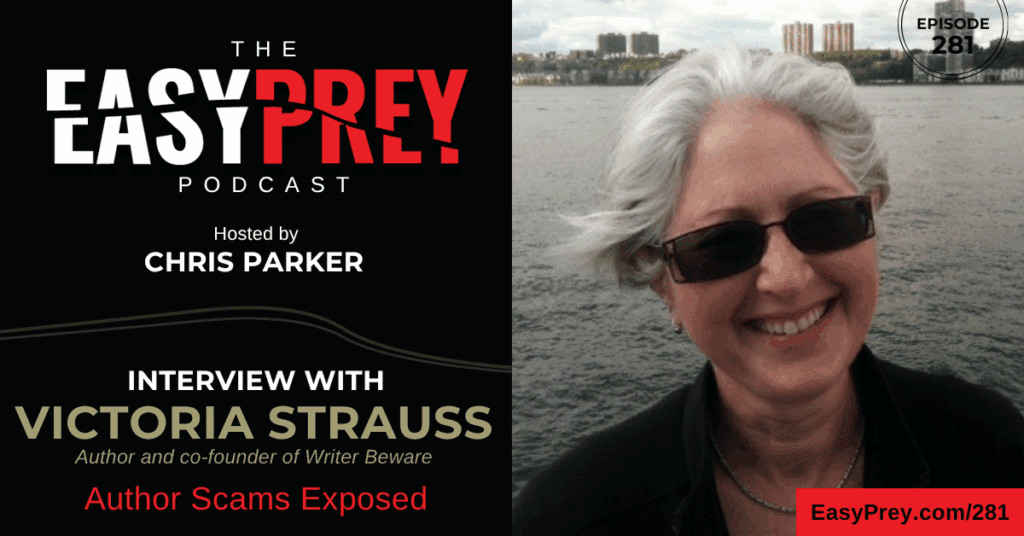
Writers pour their hearts into their work, but unfortunately, that passion can make them prime targets for scams. From fake agents and vanity publishers to slick marketing schemes and social media impersonators, the tactics have only gotten more sophisticated over time. In this episode, we dig into the murky world of publishing scams and how they work and who they target. Along with why even experienced authors can get caught off guard.
Today’s guest is Victoria Strauss. Victoria is the author of nine fantasy and historical novels for adults and teens, and she’s also the co-founder of Writer Beware, a watchdog group sponsored by the Science Fiction and Fantasy Writers Association. Drawing from decades of experience, Victoria shares red flags to watch out for, practical steps authors can take to protect themselves, and eye-opening stories of deception that highlight just how easy it is to get pulled in.
This conversation is about awareness and empowerment. Whether you’re just getting started or you’re a seasoned author, you’ll learn how to do your due diligence, where to turn for trustworthy resources, and how to avoid becoming an easy target in a complex industry. With tools like Writer Beware, Victoria equips authors to stay vigilant, protect their creative work, and steer clear of costly traps.
“Being a writer today means wearing two hats: creator and businessperson. You’ve got to protect both your art and your assets.” - Victoria Strauss Share on XShow Notes:

- [01:00] Victoria shares her background including publishing nine novels. She's a member of the Science Fiction and Fantasy Writers Association, which is the sponsor of Writer Beware.
- [01:49] Writer Beware was formed with Victoria and a colleague when they became interested in writer scams.
- [03:36] When it first began, the most common scams for fee-charging literary agents and scam editing referrals.
- [04:25] Most current scams are digital and focus on self-publishers.
- [05:11] We learn what a vanity publisher is.
- [06:22] How self-publishers do everything a writer does and everything a publisher does.
- [10:34] One marker for a scam can be solicitation and out-of-the-blue emails.
- [12:42] A lot of people offer services like cover design when they don't really have the experience or expertise. Research anyone you're going to hire and their experience.
- [15:50] Look for what to cover in a contract, such as keeping your copyright. Watch out for scam registration services.
- [17:36] A DM scam where the scammer impersonates a writer and offers a marketing service recommendation.
- [22:21] Be aware and understand what the risks are and what to look for.
- [23:52] Evaluating opportunities.
- [26:16] Use a credit card and report any problems.
- [27:51] The newest scams are usually on social media.
- [28:40] A crazy story about a literary agent who is charging upfront fees and even accepted fees for a conference and then faked her own death.
- [30:39] A cautionary tale of how a publishing marketing company from the Philippines scammed authors out of millions of dollars.
Thanks for joining us on Easy Prey. Be sure to subscribe to our podcast on iTunes and leave a nice review.
Links and Resources:
- Podcast Web Page
- Facebook Page
- whatismyipaddress.com
- Easy Prey on Instagram
- Easy Prey on Twitter
- Easy Prey on LinkedIn
- Easy Prey on YouTube
- Easy Prey on Pinterest
- Victoria Strauss
- Books by Victoria Strauss
- Writer Beware
- Writer Beware Blog
- [email protected]
- Writer Beware – Facebook
- Science Fiction and Fantasy Writers Association
- Self-Publishing 101 – SFWA
- Authors Guild
Transcript:
Victoria, thank you so much for coming on the podcast today.
Thank you for having me. I'm glad to be here.
Can you tell me a little bit about your background, who you are, and what you do?
I am a writer. I published nine novels for adults and young adults. I mostly write fantasy. I've also written a couple of historical novels. I'm a member of the Science Fiction and Fantasy Writers Association, which is the sponsor of Writer Beware, which I currently run.

How did you guys start that?
I co-founded it with my friend and colleague, the late Ann Crispin. We had both gotten interested in writing scams. I was never scammed, but I really could have been because I didn't know a lot about publishing when I started out. But when I first started to get active online in the late 1990s—which is really dating myself, but there you go—I encountered all these terrible stories that writers were sharing about being ripped off by fee-charging literary agents or unscrupulous vanity publishers.
I had no idea this kind of thing existed. I got interested and began kind of following these stories at the same time. Kristen, who I didn't know at that point, was also concerned about writing scams and was looking to establish a writing scams committee of the Science Fiction and Fantasy Writers Association, which is very interested in helping to educate and advocate for new writers as well as established ones. A kind soul who knew us both introduced us and we realized that we shared an interest and we were working on the same things so we decided to combine forces, and that's how Writer Beware was born.
At the time you started, what was the most common scam going around?
Fee charged by literary agents. Scam-editing referrals. You submit a query to a literary agent and the agent would say, “This just isn't quite good enough. I can refer you to this editing service.” The agency was really just passed through to the editing service. That may be publishers charging huge fees, doing shoddy work, or never producing the books at all.
That's really what was most common in the late 1990s and early 2000s before the digital revolution. Now all the scams are digital and most of them are focused on self-publishers.
Now all the scams are digital and most of them are focused on self-publishers. -Victoria Strauss Share on XFor those that are not in the writing space, what is a vanity publisher and why would someone who is looking to produce a book use such a publisher?
A vanity publisher is a publisher, charges a fee for publication, usually greatly inflated above the actual cost of production in order to ensure profit. Exercises maybe some minimal degree of selectivity, but basically publish pretty much everything that comes in the door. It saves money by providing shady editing, design, et cetera and not doing any kind of meaningful book marketing. There are no longer all that many fee-charging literary agents thanks to the growth of self-publishing options.
I mean, once writers have an alternative to the agent to publish a route, it's not so lucrative to be a fee-charging agent. Vanity publishers, however, are still around and very much a trap for aspiring writers.
How has that changed with the rise of Amazon and a variety of self-publishing services? How has that changed the scam landscape for authors?
Self-publishers have to do everything a writer does, but they also have to do everything a publisher does. Either they have to engage cover designers, editors, et cetera, and pay them out of pocket or they engage a service that will do it all for them and upload their book to KDP or IngramSpark or whatever and the scams now cluster around that area of publishing because self-publishing writers need more services, which is an opportunity for unscrupulous people to make a quick buck by overcharging and under-delivering.
Also, there are many scams that look like self-publishing services that will edit and format your book and upload it to Amazon, but actually the goal is to kind of get you in the doors so that they can then subject you to intense upselling pressure with more and more marketing services. They say that you have to buy actual frauds, such as book order scams or fake offers from Netflix or a major publisher that requires you to pay enormous fees. That really is the most active area of writing scam these days.
Is a lot of it around kind of exploiting the author's desire to be like a popular writer or like a bestselling author?
Yes, there are. That is one of the things that is definitely exploited. There are a lot of books, both traditional and self-published, that are in very crowded fields. It's really difficult for any given author to gain traction and get exposure and stand out among all the other competing books.
One of the kinds of psychological levers that scammers use is the promise that they can kind of lift the writer above the herd and make sure that their book gets noticed. -Victoria Strauss Share on XOne of the kinds of psychological levers that scammers use is the promise that they can kind of lift the writer above the herd and make sure that their book gets noticed. It deserves that. It gets lots of sales. It's even on The New York Times bestseller list. I mean, all of these false promises that are designed to appeal to writers' hope and desire.
This type of scam doesn't just focus on writers. Any creative field is subject to it. Desire is high, access is limited, and success is difficult to achieve. Scammers always cluster there at that point.
This type of scam doesn't just focus on writers. Any creative field is subject to it. Desire is high, access is limited, and success is difficult to achieve. Scammers always cluster there at that point. -Victoria Strauss Share on XIs it also kind of a mix of there are people that are purely trying to scam and get money for not providing a service? Then you have those that are, “We’ll provide a service, but it's gonna be a really crummy service at too high of a price.” Is there a way for authors to be able to figure out which is an outright scam and which is just a low-quality service?
It can be difficult. One of the things that I try to do with Writer Beware's website and blog is to identify kinds of markers that the writer should look for. These days, a major marker is solicitations. If you get an out-of-the-blue email that says, “We can transition you to traditional publishing, or you can provide this fantastic marketing service. It's going to get you millions of sales.” That kind of thing is very often a marker for a scam.
Even if it turns out to be legit, you really need to check into it and not take it at face value, but you are right, there's a thin line between outright fraud and just a predatory business that makes money by providing shoddy services but actually does deliver something for the money. It can be very hard to draw that line, but as far as Writer Beware is concerned, those kinds of companies are as much aware as the outright frauds because they'll screw you over and do you no good.
I'm working on a book. It's been interesting because I'm working with a cover designer who's done books before, and I realized, man, like if I wasn't working with someone who's done books before, but maybe they're a really good artist, but if they don't know the right format or the right dimensions and how to communicate those, and like all the nuances of that, I'm sure it could just become extremely complex very quickly.
Yes. A lack of experience or competence is a big pitfall as well. There are a lot of people who offer services like cover design or editing who are really minimally qualified and they may have really good intentions, but they just are not very good at the job. It's really important to research anybody you're thinking of hiring. Ideally, they'll have experience in whatever field you're hiring them to do a job where they have worked for a publisher or they would've designed covers for other books that you can verify and check out. And always ask for references and see if you can find customers and talk to them. You really do need to be careful.

When you have a particular community, let's say the science fiction and fantasy writers, is it a pretty good community where if someone asks, “Does anyone have any recommendations for book covers or editors” that people are willing to share and recommend, or are people kind of protective? “I found a good cover designer. I'm going to keep it quiet because I want to keep them just for my stuff,” so to speak.
No, in my experience, writers in general are very generous with this kind of information. Then you have a resource like the Kindle boards where people share all kinds of information and recommendations. The different writing communities, I think, tend to be very supportive and generous with this kind of info.
There are a lot of good resources out there. For instance, the Science Fiction and Fantasy Writers has a Self-Publishing 101 resource on its website with all kinds of great information. I should say Writer Beware is sponsored by SFWA, but we serve writers in all genres and in all stages of their careers, not just aspiring writers or self-publishing writers, but people in mid-career, traditionally published authors, and we hear about all kinds of wacky things that happen inside and outside the publishing industry.
I mentioned at some point that when someone's a new author, they're kind of self-publishing or doing kind of things like that. At some point, if they start to become successful and they're working with agents and people like legitimate agents or quote unquote legitimate, are there contractual things that they should be watching out for, clauses in contracts that are like don't ever sign a contract that has dissonant or make sure your contracts always have that in it.
Yes, absolutely. That's an area that we definitely cover and write and warn about. For example, you don't want your grant of rights clause and a publishing contract to include a copyright transfer that gives your publisher ownership of your copyright. There are a whole bunch of issues. We, on our blog, have a contracts category, which has a lot of articles about that sort of thing.
I assume just in the way there are people trying to take advantage of people with book covers that are trying to take advantage of people with here's how to secure your copyright and it's in a way that's detrimental to the author.
Yes, there are actually several kinds of semi-scam copyright registration services that charge you a fee for something that's not registration at all or will do your registration for you, but they'll charge you like four times what it would cost you if you do it yourself. A lot of these things exist kind of on the gray line between scam and pitfall. It really sucks that people have to be so careful now even on social media now.
There's a really common scam where you get a friendly DM from someone who appears to be a real author and there's some nice chit chat back and forth. You share information about your work. But the author is being impersonated by a scammer, and the goal ultimately is to refer you to a marketing service that will charge you hundreds of dollars for marketing that's basically junk if it's delivered at all. Even what appears to be friendly interaction with a fellow author, you have to be on your guard.
Is that also one challenge of authors is that once they gain any level of notoriety, that people are starting to impersonate them online?
Not really it, from what I've seen, it is fairly random. I mean some of these impersonations are really famous authors like John Green. Some of them are just names that seemed to be randomly chosen. I can't really trace the logic of it, but I think anybody who has a substantial online presence is a potential target just because they're out there and easy to find.

Are there places online where everything that happens here is a scam versus hopefully there's other places where if Writer Beware has a group, obviously there's going to be some people that are going to infiltrate the group and try to perpetrate scams, but are other particular communities that are safer or more dangerous for authors?
Not really. I mean, you do have to be careful. But in general, any scammer can infiltrate any writer's community. I think in general, social media is risky just because of the nature of social media; it really lends itself to scams and impersonations and not just writers. I mean, online scams are everywhere.
I think in general, social media is risky just because of the nature of social media; it really lends itself to scams and impersonations and not just writers. I mean, online scams are everywhere. -Victoria Strauss Share on XI don't think that I could endorse any writer's groups as 100% safe. It's very important to be aware. I think that scams exist and many of the writers who contact me to ask about companies or to report problems we're not aware of, which is not their fault. I mean, that information isn't necessarily available unless you know to look for it.
That kind of general scam awareness is important to your protection. If you're going to be a writer, you're going to be active online by the same token. I know I'm thinking about what we've talked about and it sounds like there's nothing that could be trusted and everything is a scam and it doesn't matter what you do, you're going to get ripped off. That's not true at all.
It's like riding a motorcycle, I suppose, that there's a decent possibility of getting into an accident. You are aware of this. You take precautions, you wear a helmet, you obey traffic signals and because you're prepared and aware, you are much safer. That's the same with being an author and being online—you need to be aware. You need to understand what the risks are. You need to look at Writer Beware so you know what's out there that might threaten you.
But as long as you know that, it becomes much easier to recognize scams when you encounter them or to suspect that something is off, then you can proceed with all of the many, many, many legitimate opportunities and resources there are. It's a balance.

Are there ways that authors can, aside from referrals and talking to other people, that people could kind of do a little bit of due diligence themselves on whether opportunities like contests or having your book part of a recommended reading list? I mean, if someone comes to you and says, “Hey, we can get you on Oprah's Book Club,” that's probably a red flag. I assume that there are some awards and contests that people can participate in that are legitimate and reader-recommended reading lists that they can do something to increase the likelihood that their book will be on there. How would they go about evaluating? What should they be looking for to figure out whether this is a real opportunity or just a scam?
Well, you look at the sponsor, the company, whatever company or organization is behind the award or the list, you check it out to see if it's established, if it seems to be legit. Contests that spring up all the time are mainly about making a profit for the sponsor, and you'll look at them and see they've only been around for a year, and yet they're touting themselves as being a major prestigious award and not so much. If the entry fee is really high or somebody says, “We can get you an interview in this great magazine or presence on a reading list, but you have to pay,” that's definitely a warning sign.
The key is not to take anything at face value. Always double check. If there are claims about who's judging the contest or the organization that's sponsoring whatever it is, make sure that you can actually verify those.
Got you. If an author has been a victim of a scam or they think they have, are there any kind of writer-centric organizations that can help them? Or are they pretty much on their own?
If you are a member of a professional writer's group, such as The Authors Guild, there may be legal resources that can help. Otherwise, you are pretty much on your own as much as any consumer is on their own when they've been defrauded. There are places that you can report such as the Internet Crime Center, the FTC. I always recommend that writers dispute. Hopefully, they used a credit card and didn't pay via wire transfer, which is not reversible. But if they did use a credit card, they can dispute the charges and there's usually a limited window for doing that. But even if you are going beyond that, it's worth doing because banks and credit card companies will often work with fraud victims.
I got a lot of reports about a particular UK publisher that charged a fee to publish, acquired hundreds of books and then never published and hit them. This happened over a period of three or four years, and many of those writers have been able to get their money back by filing fraud claims with their banks.
It's always worth doing, and I have a post on my blog that specifically suggests techniques and resources for reporting and doing that sort of thing. But yeah, it is pretty much up to the individual writer to take action. Of course, always report to Writer Beware because if I know about these things, I can warn about them.
Is there a particularly new or recent that you have become aware of in the recent past?
I think the social media scam is the newest scam wrinkle. They're all a piece because they all drive to the same goal, which is tricking authors out of money. But they take different forms. That's really, I think, the most recent iteration.
As we wrap up here, is there a particular one warning tale that stuck with you over your years of running of Writer Beware?
Well, I can tell you crazy stories or I can tell you cautionary tales.
Let's do one of each. Let's do one crazy story and one cautionary tale.
The crazy story, this happened several years ago. A literary agent named Melanie Mill, she was charging upfront fees and she organized a conference and accepted fees for attendance, and then absconded with the money and faked her own death. Her supposed assistant sent out an email to the conference attendees saying, sadly, Melanie has died in a car crash.
Several months later, an identical scheme popped up in Canada, and it turned out she wasn't dead at all. She had gone to Canada to run the same scheme and Writer Beware was contacted by the Royal Canadian Mounted Police who did an investigation into her. It turned out that she was a wanted felon. She was wanted for not just kiting bad checks, but for attempted murder.

Oh my goodness.
She had to run her mother over with a car, and she fled those charges, and that's how she wound up being a literary agent in the first place. She absconded again, was eventually apprehended and returned to the United States. She pretended to have gone insane and in order to be not competent for trial, but it was all pretense. She did eventually get a jail sentence, but that's definitely one. She's not the only scammer who has faked her death. So it's not unknown to happen.
One cautionary tale?
There was a publishing marketing company called Page Turner Press Media operating out of the Philippines, but with a purported US presence, and it scammed authors out of millions of dollars. I mean, individual authors lost as much as $600,000 on publishing schemes. They had a fake movie studio that charged six figures for turning the author's books into a film and supposedly production costs, and it was just a whole elaborate scheme that went on for several years.
Then, in December 2024, apparently, they had gotten on the FBI's radar because some of the more extensively defrauded offers and were reports. The CEO and VP of this company decided to make a Christmas visit to the US to visit their relative, who was also involved in the scheme, and they were arrested. The FBI seized the domain, and it shut down the parent company in the Philippines. All of the sales reps who have been helping to run this scam sort of scattered to other similar companies, and now these three people are incarcerated and awaiting trial.
It is the only time a scam of this type has ever gotten significant attention from American law enforcement. This is a type of scam that's based overseas, but operates almost exclusively in the USA, and Page Turner is the most egregious example, but there are hundreds of companies like this all looking to rip authors off.
Where can authors go to learn more and stay informed about current publishing scams?
The Writer Beware blog is the main resource for up-to-the-minute reporting. It's writerbeware.blog. There's also the writer's website, which is a general resource on scams that exist and what to watch out for. There are sections on literary agents, publishers, self-publishing, vanity publishers. It's a compendium of general warnings, and that is writerbeware.com. Then we have a Facebook page where we post news and information, and people can have discussions, and that's facebook.com/writeraware.
With a singular writer beware, not multiple writers.
Right. Writer Beware, not writers beware.
If people wanna be able to connect with you, how can they connect with you?
I am on Bluesky under my name, Victoria Strauss. That’s my main social media presence at the moment. You can also reach me via email at [email protected].
Awesome. Victoria, thank you so much for coming on the podcast today. I really appreciate your time.
Oh, thank you for having me. This was fun.


Leave a Reply